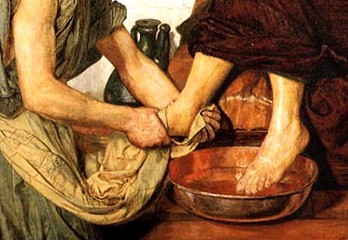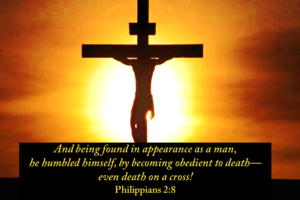Did your parents ever say to you, “Hop to it?” What is it about their imploring urgency that instills in us healthy fear propelling us into action?
I imagine God is telling us to, “Hop to it,” but as is apropos to His ever mysterious, multilayered way of speaking, He probably means more than just, “Get busy or else!” Although it’s not a bad thing to have a heathy fear of God: a deep love for His Awesomeness that makes us quiver with respect and intense desire to not offend His Goodness.
Not that I can read the mind of God but, I thought we’d explore what else God might mean when He says, “Hop to it.”
Three things came rushing to my sacred imagination:
- Humility
- Obedience
- Perseverance
In the interest of keeping each post short. We’ll break up this discussion in three parts. Here’s Part I:
H is for Humility…
Let’s begin our reflection with the Word to guide us:
Take my yoke upon you and learn from me, for I am gentle and humble in heart, and you will find rest for your souls. For my yoke is easy and my burden is light.
Matthew 11:29-30
He has shown you, O mortal, what is good.
And what does the Lord require of you?
To act justly and to love mercy
and to walk humbly with your God.
Micah 6:8
Be completely humble and gentle; be patient, bearing with one another in love.
Ephesians 4:2
I’ll level with you, God has been keen to use more experiences in my life than I care to admit to grant me opportunities to grow in humility. I’m not sure I’ve done a very good job always accepting His invitation to grow in this virtue. I confess that with a driving, fiery, brave to a fault sometimes, and an at times proud personality always lurking below the surface of my demeanor, I’ve got a lot to learn about humility. I’m a work in progress; good thing I’m on the “eternally learning plan!”
God modeled Perfect Humility by leaving His Glory to take our form, transforming His life into a living example of humble service, and preaching constantly about humility.

Might all of this have something to do with the fact that evil breeds in cesspools of pride?
God is relational. Standalone idolatrous edifices keen on drawing all things to themselves and filled with haughty machinations to manipulate the world around them to serve their needs and desires are not part of God’s Order. God is about relationships.
Here’s the incomprehensible Good news…
God wants and needs us to be a part of His endless, infinite, massive, relational network of Unconditional Love.
This means we’re asked to yield to the tender, gentle molding tugging of His touch. Do you remember the parable about the wise and foolish builders?
24 “Therefore everyone who hears these words of mine and puts them into practice is like a wise man who built his house on the rock. 25 The rain came down, the streams rose, and the winds blew and beat against that house; yet it did not fall, because it had its foundation on the rock. 26 But everyone who hears these words of mine and does not put them into practice is like a foolish man who built his house on sand. 27 The rain came down, the streams rose, and the winds blew and beat against that house, and it fell with a great crash.” (Matthew 7: 24-27)
When we build our house of faith with humility we’re like the wise builder. God becomes our rock and our salvation. Humility connects us to God. In God, we become part of the Mystical Body of Christ. Through the Mystical Body of Christ we become connected to one another. This is not some undifferentiated blob of new age energy or woo-woo consciousness.
We are many parts of One Body. Our Lord makes us One with Him without us losing any of the individual gifts, and talents that makes us precious priestly co-creators in Christ. God orchestrates things in concert with each other for He is the God of All in All.
Pride insists on standing apart. Pride abhors communion with anything other than itself. Pride self-abnegates our connection with our true self, others, and most importantly with God. If we’re like the foolish builder and make the grainy, shifty, individualistic grains of sand the foundation of our home (our habitat) we will crumble into SURE RUINS.
Here’s a storied piece of imagination to animate our discussion. At one point or another, you’ve likely run across this tale:

An old woman is nearing the end of her life. As she closes her eyes one night, she sees a bright light and is transported to another realm. She doesn’t pass away just then, instead, she returns to the living world to find her family gathered at her bedside. She smiles and whispers to her children, “I have seen the great hereafter.” “The great whereafter?” Her son asks. “Heaven and hell. I have seen them both.” The old woman goes on to explain, “I came upon a door, and behind it was hell. What I saw there confounded me. There was a dining hall filled with rows of tables, each table teaming with a magnificent feast. It looked and smelled delicious, yet the people seated around the tables were emaciated and sickly, moaning with hunger. “As I came closer, I realized that each person held a very long spoon. With it they could reach the feast, but the spoon was too long. Though they tried and tried again, they couldn’t bring nourishment to their mouth. In spite of the abundance before them, they were starving.” She continued, “I left this horrid place and opened a new door, one that led to heaven. Inside, I was surprised to see that very same scene before my eyes, a dining hall filled with row upon row of tables, and on those tables, a marvelous feast. But instead of moaning with hunger, the people around the tables were sitting contentedly, talking with one another, sated from the abundance before them. “Like those in hell, these people were holding very long spoons. As I watched, a woman dipped her spoon into a bowl of stew before her, but rather than struggling to feed herself, she extended her spoon out and fed the man seated across from her. This person, now satisfied and no longer hungry, gave thanks and returned the favor, leaning across the table to feed the woman.” “I suddenly understood the difference between heaven and hell,” the old woman said to her family. “It is neither the qualities of the place, nor of the abundance of resources, but the way people treat each other. “In hell, we are selfish. We would rather go hungry than give the people we don’t care for the pleasure of eating.” “But in heaven, we feed each other. We put trust in those around us, and never go hungry.” Source: https://wefeedeachother.tumblr.com/activity
Chaos erupts when we seek to feed ourselves. Delicious beautiful food flies all over the place in a smorgasbord of selfishness.
We have the Feast of Everlasting Life in the Limitless Body of Christ. Humility gives us a place at the table to tend to our own needs by serving others and by becoming hopefully hopelessly dependent upon the Goodness of God. We’re called to trust that we will never be lacking:

Pride and selfishness leads to hellish behaviors. We need only look around at the current state of affairs of our broken world right now to know the truth of that statement!
Jesus’ final act before His passion, death and resurrection makes His instructions regarding humility clear:

12 When he had finished washing their feet, he put on his clothes and returned to his place. “Do you understand what I have done for you?” he asked them. 13 “You call me ‘Teacher’ and ‘Lord,’ and rightly so, for that is what I am. 14 Now that I, your Lord and Teacher, have washed your feet, you also should wash one another’s feet. 15 I have set you an example that you should do as I have done for you. 16 Very truly I tell you, no servant is greater than his master, nor is a messenger greater than the one who sent him. 17 Now that you know these things, you will be blessed if you do them. (John 13:12-17)
Questions to think about:
- How am I growing in humility?
- What are the areas of my life I need more of Jesus’ Wisdom and Mercy to grow?
- What’s one thing I can do today to embody more Jesus meek and humble spirit?
One thing that has been helping me is this Litany of Humility by Rafael Cardinal Merry del Val y Zulueta:
O Jesus, meek and humble of heart, hear me.
From the desire of being esteemed, deliver me, Jesus.
From the desire of being loved, deliver me, Jesus.
From the desire of being extolled, deliver me, Jesus.
From the desire of being honored, deliver me, Jesus.
From the desire of being praised, deliver me, Jesus.
From the desire of being preferred to others, deliver me, Jesus.
From the desire of being consulted, deliver me, Jesus.
From the desire of being approved, deliver me, Jesus.
From the fear of being humiliated, deliver me, Jesus.
From the fear of being despised, deliver me, Jesus.
From the fear of suffering rebukes, deliver me, Jesus.
From the fear of being calumniated, deliver me, Jesus.
From the fear of being forgotten, deliver me, Jesus.
From the fear of being ridiculed, deliver me, Jesus.
From the fear of being wronged, deliver me, Jesus.
From the fear of being suspected, deliver me, Jesus.
That others may be loved more than I, Jesus, grant me the grace to desire it.
That others may be esteemed more than I, Jesus, grant me the grace to desire it.
That in the opinion of the world, others may increase and I may decrease, Jesus, grant me the grace to desire it.
That others may be chosen and I set aside, Jesus, grant me the grace to desire it.
That others may be praised and I unnoticed, Jesus, grant me the grace to desire it.
That others may be preferred to me in everything, Jesus, grant me the grace to desire it.
That others may become holier than I, provided that I become as holy as I should, Jesus, grant me the grace to desire it.
READ PART II: O is for Obedience
In the comments below please consider sharing with us a time when you know you grew in humility?




